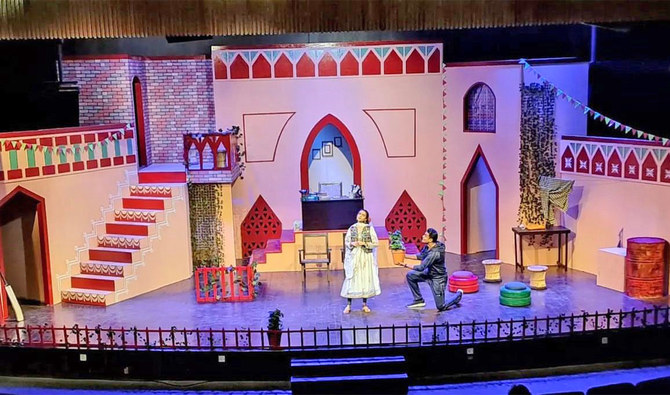KARACHI: The theater play ‘Meri Shadi Meri Marzi,’ which used political metaphors and satire to tell the tale of a young woman whose ambitions are cut short by family drama, has resumed in Karachi after its shows were disrupted because the makers felt the country’s changing political dynamics required a rewriting of the script.
The story is centered on Pakeeza, a young woman living with her father, sister and grandmother, whose plans for her own life are interrupted when her family arranges a marriage with her cousin Guddu, who lives in Britain and whose father has financially helped Pakeeza’s family in the past.
Pakeeza then meets Imtiaz and a love story unfolds, even as Guddu along with his relatives arrives in Pakistan to make sure the marriage goes ahead, triggering manipulation and conspiracies in the form of family politics — with allusions to politics on a national level — while love tries to find a way through these family pressures.
The play launched in November 2022 but was shut down when the makers felt that the original script, written by Ashar Naeem, had to be tweaked according to the rapidly changing dynamics of Pakistan’s politics. With a revised script, the play, led by director Faheem Azam, returned to the stage on January 20 and is playing at the Arts Council. It will continue until March 19.
The key technique in the play is to borrow from prominent political figures and their famous speeches, but in a more familial setting, adding to the humor.
“Whatever is happening in Pakistan is much like what’s happening at our homes. The attitude we have at home is our attitude as a nation,” Naeem, who penned a stage play for the first time, told Arab News after the performance.
“We do the same at home such as ‘might is right’, the one with money has the power to take decisions, etc. We need to fix things at home so it reflects in our nation.”
“It’s been over a year since the play was written and the country’s political situation has changed since then,” the writer said, explaining why the script needed to be revised.
Azam went with an “up-front” approach to introduce characters to the viewers, saying he added narrations and introductions to cut down on the time that it would have taken to introduce them through scene-by-scene characterization.
“I wanted it to be pleasing to the eyes and soft on the ears so they have a cinematic experience,” the director told Arab News. “I have treated emotions delicately to make it memorable for viewers.”
At a show on Sunday, ‘Meri Shadi Meri Marzi’ left many viewers in fits of laughter and several felt its use of political metaphors was apt.
“Considering the scenario in Karachi and the tough schedule people have, a two-hour entertainment like this is a welcome change,” Sibte Hassan, 33, told Arab News.
“The acting of all artistes was very good, particularly Adnan Aziz, who essayed the role of Guddu. His character was the heart and soul of the play. I enjoyed the show.”
Simran Bherwani, a 23-year-old law student, said she enjoyed the comedy in the play, in addition to the setup and dance:
“Overall, the show was up to the standard. It was relevant, going with the title, something youngsters can relate to.”
















